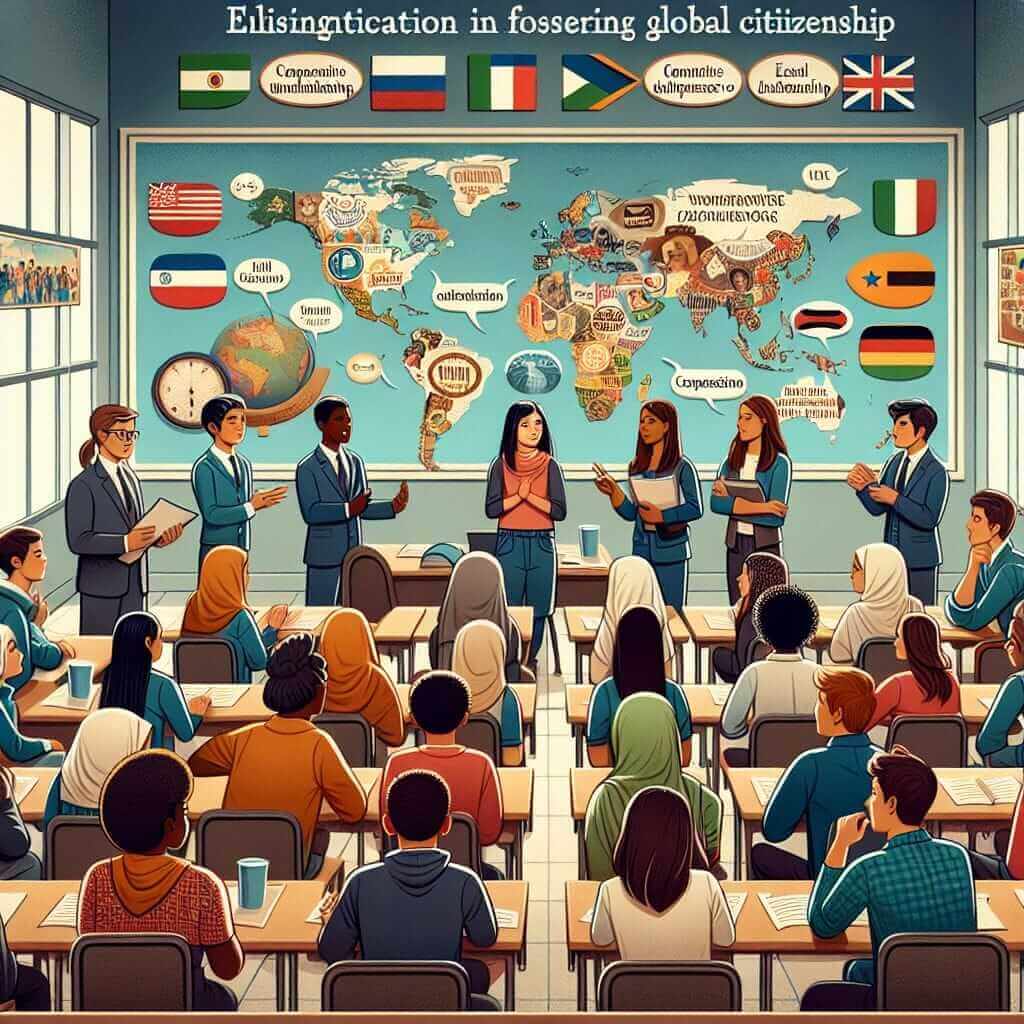When we think about education, we often link it with academic learning, skill development, and career opportunities. However, one of the most significant aspects of education transcends these typical associations, diving into the broader context of shaping global citizens. In this article, we delve into the central role education plays in fostering global citizenship, a topic increasingly prevalent in discussions surrounding modern education systems.
Introduction
The concept of global citizenship involves an individual’s understanding of and respect for global cultures, responsibilities towards global issues, and a commitment to sustainable practices that ensure a positive impact on the global community. In recent years, the topic “The role of education in fostering global citizenship” has gained substantial prominence in discussions around educational reforms.
From an IELTS perspective, this topic has appeared in various formats ranging from opinion essays to discussion essays, making it a crucial area of focus for students preparing for the exam. Below are a few sample questions that revolve around this theme:
- To what extent do you agree or disagree that education should prioritize the development of global citizenship?
- Discuss both views and give your opinion: Some people believe that the primary goal of education is to foster global citizenship, while others think it should focus on national identity.
- What are the main ways through which education contributes to fostering global citizenship?
Sample Task Analysis
For this exercise, let’s consider the topic:
“To what extent do you agree or disagree that education should prioritize the development of global citizenship?”
Understanding the Prompt
This is an “agree or disagree” question, which requires you to present a clear position on whether education should focus on developing global citizens. Your response should include:
- An introduction stating your position.
- Paragraphs substantiating your viewpoint with examples and evidence.
- Consideration of a counterargument to show depth of discussion.
- A conclusion reiterating your stance.
Sample Essay
Introduction:
In the contemporary world, the notion of global citizenship has become increasingly relevant. The argument that education should prioritize the development of global citizenship is compelling, given the interconnected nature of our societies. I firmly agree that fostering global citizenship should be a primary objective of modern education systems.
Body Paragraph 1:
First and foremost, global citizenship education equips students with awareness and respect for cultural diversity, which is essential in our globalized society. Exposure to various cultures allows individuals to cultivate empathy and understanding, thus reducing prejudices and fostering peaceful coexistence. For example, incorporating global history and cultural studies into curricula can help students appreciate the richness of different cultural traditions and viewpoints.
Body Paragraph 2:
Moreover, education that promotes global citizenship can address global issues such as climate change, poverty, and inequality more effectively. When students are educated about these global challenges, they are more likely to develop a sense of responsibility and urgency to act upon them. Initiatives like the United Nations’ Sustainable Development Goals (SDGs) can be integrated into lesson plans, encouraging students to contribute towards a more sustainable future.
Body Paragraph 3:
In addition, developing global citizenship helps students to be more competitive in the global job market. Employers today value skills such as critical thinking, communication, and cultural competence, which are nurtured through a global citizenship curriculum. For instance, multinational companies often seek employees who can navigate different cultural contexts and collaborate with international teams.
<
p>Counterargument:
However, some critics argue that national identity should be the cornerstone of education, as it fosters loyalty and pride within a country’s borders. While this is a valid point, it need not be at odds with global citizenship. In fact, understanding one’s own culture deeply can serve as a foundation for appreciating others’, thus enhancing global citizenship.
Conclusion:
In conclusion, while education should continue to inculcate a sense of national identity, prioritizing global citizenship is indispensable in today’s interconnected world. Such an approach not only fosters multicultural understanding and addresses pressing global issues but also equips students with critical skills needed in the global workforce. Therefore, the development of global citizenship through education should be a pivotal aim in educational institutions worldwide.
Word Count: 354
Key Points for Writing
Vocabulary and Grammar Tips
-
Vocabulary:
- Global citizenship /ˈɡloʊ.bəl ˈsɪt.ɪ.zən.ʃɪp/ (noun): Awareness, responsibility, and commitment to global issues and cultures.
- Empathy /ˈɛm.pə.θi/ (noun): The ability to understand and share the feelings of another.
- Sustainable Development Goals (SDGs) /səˈsteɪ.nə.bəl ˌdɪˈvɛl.əp.mənt ɡoʊlz/ (noun): A collection of 17 global goals set by the United Nations General Assembly in 2015.
- Cultural competence /ˈkʌl.tʃər.əl ˈkɑːm.pə.təns/ (noun): The ability to understand, communicate with, and effectively interact with people across cultures.
- Interconnected /ˌɪn.tə.kəˈnɛk.tɪd/ (adjective): Mutually joined or related.
-
Grammar:
- Complex sentences: Use complex sentences to articulate nuanced ideas and show command over the language, e.g., “While some argue for national identity as the primary educational focus, integrating global citizenship can complement it by broadening students’ perspectives.”
- Coherence and Cohesion: Ensure logical flow and clarity. Use linking words (e.g., “for example”, “moreover”, “however”) and pronouns to connect ideas smoothly.
Conclusion
The role of education in fostering global citizenship is a pertinent topic that interlinks various dimensions of global awareness, responsibility, and cultural competence. As discussed, education not only aids in understanding cultural diversity but also equips students to address global issues and enhances their professional competitiveness. Prospective IELTS candidates are advised to familiarize themselves with this topic and practice writing essays to refine their arguments and improve their language skills. Other related topics that might appear in the exam include lifelong learning, digital platforms’ influence on global communication, and the role of education in promoting sustainable development.
Ultimately, mastering this topic not only prepares one for the IELTS exam but also broadens one’s understanding of integral global themes, making one a more informed and responsible global citizen.